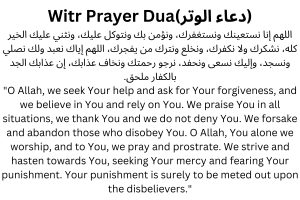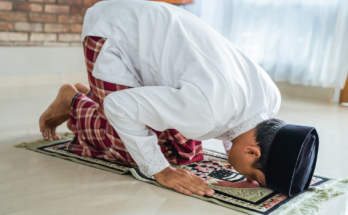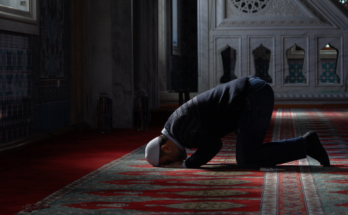Introduction
In Islam, prayer is one of the most important acts of worship that Muslims perform. The Witr Prayer is one of the obligatory and desirable night Prayers, and it is considered one of the confirmed Sunnahs in Islamic law. Witr Prayer means the individual prayer that is performed after the Isha prayer and before the Fajr prayer. In this article, we will learn how to perform the Witr Prayer and the rulings related to it.
Benefit from Witr Prayer
Witr Prayer has many benefits for Muslims. One of the most important spiritual benefits is that it enhances closeness to God and strengthens faith and piety. Witr Prayer is also an opportunity to repent, seek forgiveness, and pray to God Almighty. In addition, performing the Witr Prayer helps in organizing the time and arranging the daily life of a Muslim.

Provisions of Witr Prayer
There are some rulings related to the Witr Prayer that Muslims must observe. Among these provisions:
1. Witr is obligatory
Witr Prayer is an obligatory prayer for obligatory Muslims. This means that every Muslim who has reached the age of prayer must perform the Witr Prayer.
2. The number of rak’ahs of the Witr Prayer
Witr Prayer consists of three rak’ahs. A Muslim can pray one rak’ah or three rak’ahs in a row.
3. Witr Prayer after Isha Prayer
It is preferable to perform the Witr Prayer after the Isha prayer and before the Fajr prayer. However, it can be performed at any time after the evening prayer and even before the dawn prayer.
4. Intention in Witr Prayer
A Muslim must make the intention to perform the Witr Prayer in his heart before starting the prayer. The intention does not need to be pronounced verbally.
How to perform Witr Prayer
Witr Prayer can be performed as follows:
1. The first takbeer
After the intention, the Muslim begins the Witr Prayer with the first takbeer, where he says “God is great.”
2. Reciting Al-Fatihah and the other surahs
A Muslim reads Surah Al-Fatihah and S
Another recitation of the Holy Quran after the first takbeer.
3. Bowing and prostrating
The Muslim bows after the recitation, where he says takbeer, then bows and says “Glory be to my Lord the Great” three times or more. Then he returns to standing and says, “God listens to him who praises Him.” Then he says, “Our Lord, praise be to You,” and returns to bowing and prostrating.
4. Prostration and tashahhud
The Muslim prostrates after standing, saying the takbeer, then prostrating and saying “Glory be to my Lord the Most High” three times or more. Then he returns to sitting and recites the final tashahhud.
5. Delivery
The Muslim concludes the Witr Prayer with a salutation, whereby he pronounces “Peace be upon you and God’s mercy” with the right and left.

The best time for Witr Prayer
The preferred blessed times for the Witr Prayer are after the Isha prayer and before the Fajr prayer. However, the Witr Prayer can be performed at any time after the Isha prayer and even before the Fajr prayer.
Witr Prayer Supplications
Here are some supplications that can be recited in the Witr Prayer:
– “O Allah, I seek refuge in Your pleasure from Your anger, and in Your pardon from Your punishment, and I seek refuge in You from You.
– “Oh God, I seek refuge in You from the hardships of affliction, the overthrow of misery, the bad judgment, and the gloating of enemies.”
– “O Allah, I ask You for guidance and met, and chastity, and the rich.”
Intention in Witr Prayer
A Muslim must make the intention to perform the Witr Prayer in his heart before starting the prayer. The intention does not need to be pronounced verbally.
The number of rak’ahs of the Witr Prayer
Witr Prayer consists of three rak’ahs. A Muslim can pray one rak’ah or three rak’ahs in a row.
Sunnah in Witr Prayer
Witr Prayer is one of the confirmed Sunnahs in Islamic law. This means that it is from the Sunnah of the Prophet to perform this prayer.
Dua e Qunoot With Translation
اللهم إنا نستعينك ونستغفرك، ونؤمن بك ونتوكل عليك، ونثني عليك الخير كله، نشكرك ولا نكفرك، ونخلع ونترك من يفجرك، اللهم إياك نعبد ولك نصلي ونسجد، وإليك نسعى ونحفد، نرجو رحمتك ونخاف عذابك، إن عذابك الجد بالكفار ملحق.
Transliteration:
“Allahumma inna nastaeenuka wa nastaghfiruka, wa nu’minu bika wa natawakkalu alayka, wa nuthni alayk alkhair kullah, nashkuruka wala nakhiruka, wa nakhla’u wa natharu man yufjiruka. Allahumma iyyaka na’budu wa laka nusalli wa nasjud, wa ilayka nas’a wa nahfid, narju rahmataka wa nakhafu athabak, inna athabak al-jadd bil-kuffar mulhiq.”
Translation:
“O Allah, we seek Your help and ask for Your forgiveness, and we believe in You and rely on You. We praise You in all situations, we thank You and we do not deny You. We forsake and abandon those who disobey You. O Allah, You alone we worship, and to You, we pray and prostrate. We strive and hasten towards You, seeking Your mercy and fearing Your punishment. Your punishment is surely to be meted out upon the disbelievers.”

Issues related to Witr Prayer
There are some issues related to the Witr Prayer, such as:
What should a Muslim do if he forgets the Witr Prayer?
If a Muslim forgets the Witr Prayer, he must perform it as soon as he remembers it. He can pray it after the Fajr prayer or at another time, for example before the Dhuhr prayer. But he must spend the string he forgot.
Frequently asked questions about Witr Prayer
Here are some frequently asked questions about Witr Prayer:
1. Can the Witr Prayer be made up after the Fajr Prayer?
Yes, the Witr Prayer can be made up after the Fajr Prayer in case it was forgotten.
2. Is it permissible to read the Qur’an after the Witr Prayer?
Yes, it is permissible to read the Qur’an after the Witr Prayer.
3. Is it permissible to perform the Witr Prayer before the Isha prayer?
Yes, it is permissible to perform the Witr Prayer before the Isha prayer. But its legitimate time ah
And after the evening prayer.
4. Is it obligatory to recite a specific surah in the Witr Prayer?
No, there is no specific surah that must be recited in the Witr Prayer. A Muslim can recite any surah of the Holy Quran.
5. Is it possible to interrupt the Witr Prayer between rak’ahs?
No, it is not permissible to interrupt the Witr Prayer between rak’ahs. Consecutive rak’ahs must be prayed without interruption.
6. Is it possible to perform the Witr prayer with three rak’ahs?
Yes, the Witr Prayer can be performed with three rak’ahs. A Muslim can pray it consecutively or divide it into two rak’ahs and a separate rak’ah.
7. Is it permissible to delay the Witr Prayer even before the Fajr prayer?
Yes, the Witr Prayer can be delayed even before the Fajr prayer. However, it is preferable to perform it at its legitimate time after the evening prayer.
8. Is it permissible to make up the Witr prayer after Fajr?
Yes, the Witr Prayer can be made up after the Fajr prayer if it is forgotten or delayed.
9. Is it obligatory to recite a special supplication after the Witr Prayer?
No, there is no specific supplication that must be recited after the Witr Prayer. A Muslim can call God whatever he wants and turn to Him with his personal affairs.
10. Is it permissible to add rak’ahs to the Witr Prayer?
No, it is not permissible to add rak’ahs to the Witr Prayer. You must pray the fixed number of three rak’ahs.
Conclusion
Witr Prayer is one of the important acts of worship in Islam, and it is one of the confirmed Sunnahs. This prayer enhances closeness to God and strengthens faith. This prayer contains provisions, supplications, and a specific method of execution. Muslims should observe these provisions and perform this prayer regularly. You may have more questions about Witr Prayer, so we will answer some common questions you may have.
In the end, Muslims must perform the Witr Prayer regularly in accordance with Sharia rulings. This prayer is an opportunity to connect with God and to strengthen faith and piety. We ask God to accept our prayers and to guide us and make us firm on the straight path.
صلاة الوتر باللغه العربيه
مقدمة
في الإسلام، الصلاة هي واحدة من أهم العبادات التي يقوم بها المسلمون. تعتبر صلاة الوتر إحدى صلوات الليل الواجبة والمستحبة، وتعد من السنن المؤكدة في الشرع الإسلامي. صلاة الوتر تعنى بالصلاة الفردية التي تصلى بعد صلاة العشاء وقبل صلاة الفجر. في هذا المقال، سنتعرف على كيفية أداء صلاة الوتر والأحكام المتعلقة بها.
الفائدة من صلاة الوتر
صلاة الوتر لها فوائد عديدة للمسلمين. من أهم الفوائد الروحية هي أنها تعزز القرب إلى الله وتعزز الإيمان والتقوى. صلاة الوتر تعتبر أيضًا فرصة للتوبة والاستغفار والدعاء إلى الله تعالى. بالإضافة إلى ذلك، فإن أداء صلاة الوتر يساعد في تنظيم الوقت وترتيب الحياة اليومية للمسلم.
أحكام صلاة الوتر
هناك بعض الأحكام المتعلقة بصلاة الوتر التي يجب على المسلمين مراعاتها. من بين هذه الأحكام:
1. الوتر واجبة
صلاة الوتر هي صلاة واجبة على المسلمين المكلفين. يعني ذلك أنه يجب على كل مسلم بلغ أداء صلاة الوتر.
2. عدد ركعات صلاة الوتر
صلاة الوتر تتكون من ثلاث ركعات. يمكن للمسلم أن يصلي ركعة واحدة أو ثلاث ركعات متتالية.
3. الوتر بعد صلاة العشاء
يفضل أداء صلاة الوتر بعد صلاة العشاء وقبل صلاة الفجر. ومع ذلك، يمكن أداءها في أي وقت بعد صلاة العشاء وحتى قبل صلاة الفجر.
4. النية في صلاة الوتر
يجب على المسلم أن ينوي أداء صلاة الوتر في قلبه قبل البدء في الصلاة. لا يلزم نطق النية باللسان.
كيفية أداء صلاة الوتر
يمكن أداء صلاة الوتر على النحو التالي:
1. التكبيرة الأولى
بعد النية، يبدأ المسلم صلاة الوتر بالتكبيرة الأولى، حيث يقول “الله أكبر”.
2. القراءة الفاتحة والسورة الأخرى
يقرأ المسلم سورة الفاتحة وس
ورة أخرى من القرآن الكريم بعد التكبيرة الأولى.
3. الركوع والسجود
يقوم المسلم بالركوع بعد القراءة، حيث يكبّر ثم يركع ويقول “سبحان ربي العظيم” ثلاث مرات أو أكثر. ثم يعود إلى الوقوف ويقول “سمع الله لمن حمده” ثم يقول “ربنا لك الحمد” ويعود إلى الركوع والسجود.
4. السجود والتشهد
يقوم المسلم بالسجود بعد الوقوف، حيث يكبّر ثم يسجد ويقول “سبحان ربي الأعلى” ثلاث مرات أو أكثر. ثم يعود إلى الجلوس ويقرأ التشهد الأخير.
5. التسليم
يختتم المسلم صلاة الوتر بالتسليم، حيث يلفظ “السلام عليكم ورحمة الله” باليمين والشمال.
أفضل وقت لصلاة الوتر
تفضل الأوقات المباركة لصلاة الوتر هي بعد صلاة العشاء وقبل صلاة الفجر. ومع ذلك، يمكن أداء صلاة الوتر في أي وقت بعد صلاة العشاء وحتى قبل صلاة الفجر.
أدعية صلاة الوتر
هنا بعض الأدعية التي يمكن قراءتها في صلاة الوتر:
– “اللهم إني أعوذ برضاك من سخطك، وبمعافاتك من عقوبتك، وأعوذ بك منك، لا أحصي ثناءً عليك، أنت كما أثنيت على نفسك.”
– “اللهم إني أعوذ بك من جهد البلاء، ودرك الشقاء، وسوء القضاء، وشماتة الأعداء.”
– “اللهم إني أسألك الهدى، والتقى، والعفاف، والغنى.”
النية في صلاة الوتر
يجب على المسلم أن ينوي أداء صلاة الوتر في قلبه قبل البدء في الصلاة. لا يلزم نطق النية باللسان.
عدد ركعات صلاة الوتر
صلاة الوتر تتكون من ثلاث ركعات. يمكن للمسلم أن يصلي ركعة واحدة أو ثلاث ركعات متتالية.
السنة في صلاة الوتر
صلاة الوتر من السنن المؤكدة في الشرع الإسلامي. يعني ذلك أنه من السنة النبوية أداء هذه الصلاة.
المسائل المتعلقة بصلاة الوتر
هناك بعض المسائل المتعلقة بصلاة الوتر، مثل:
ماذا يفعل المسلم إذا نسي صلاة الوتر
إذا نسى المسلم صلاة الوتر، فيجب عليه أداءها فور تذكرها. يمكنه أن يصليها بعد صلاة الفجر أو في وقت آخر، قبل صلاة الظهر مثلاً. لكنه يجب أن يقضي الوتر الذي نسيه
الأسئلة الشائعة حول صلاة الوتر
هنا بعض الأسئلة الشائعة حول صلاة الوتر:
1. هل يمكن قضاء صلاة الوتر بعد صلاة الفجر؟
نعم، يمكن قضاء صلاة الوتر بعد صلاة الفجر في حالة نسيانها.
2. هل يجوز قراءة القرآن بعد صلاة الوتر؟
نعم، يجوز قراءة القرآن بعد صلاة الوتر.
3. هل يجوز أداء صلاة الوتر قبل صلاة العشاء؟
نعم، يجوز أداء صلاة الوتر قبل صلاة العشاء. ولكن الوقت المشروع لها ه
وبعد صلاة العشاء.
4. هل يجب قراءة سورة محددة في صلاة الوتر؟
لا، ليس هناك سورة محددة يجب قراءتها في صلاة الوتر. يمكن للمسلم أن يقرأ أي سورة من القرآن الكريم.
5. هل يمكن قطع صلاة الوتر بين الركعات؟
لا، لا يجوز قطع صلاة الوتر بين الركعات. يجب أن تصلى الركعات المتتالية دون انقطاع.
6. هل يمكن أداء صلاة الوتر بثلاث ركعات؟
نعم، يمكن أداء صلاة الوتر بثلاث ركعات. يمكن للمسلم أن يصليها متتالية أو يقسمها إلى ركعتين وركعة منفصلة.
7 هل يجوز تأخير صلاة الوتر حتى قبل صلاة الفجر؟
نعم، يمكن تأخير صلاة الوتر حتى قبل صلاة الفجر. ومع ذلك، يفضل أداءها في وقتها المشروع بعد صلاة العشاء.
8. هل يجوز قضاء صلاة الوتر بعد الفجر؟
نعم، يمكن قضاء صلاة الوتر بعد صلاة الفجر في حالة نسيانها أو تأخيرها.
9. هل يجب قراءة دعاء خاص بعد صلاة الوتر؟
لا، ليس هناك دعاء محدد يجب قراءته بعد صلاة الوتر. يمكن للمسلم أن يدعو الله بما يريد ويتوجه إليه بأموره الشخصية.
10. هل يجوز إضافة ركعات إلى صلاة الوتر؟
لا، لا يجوز إضافة ركعات إلى صلاة الوتر. يجب أن تصلي بالعدد الثابت الذي هو ثلاث ركعات.
الخاتمة
صلاة الوتر من العبادات الهامة في الإسلام، وهي واحدة من السنن المؤكدة. تعزز هذه الصلاة القرب إلى الله وتقوى الإيمان. تحتوي هذه الصلاة على أحكام وأدعية وطريقة تنفيذ محددة. ينبغي للمسلمين مراعاة هذه الأحكام وأداء هذه الصلاة بانتظام. قد يكون لديك المزيد من الأسئلة حول صلاة الوتر، لذا سنجيب على بعض الأسئلة الشائعة التي قد تكون لديك.
في النهاية، يجب على المسلمين أداء صلاة الوتر بانتظام وفقًا للأحكام الشرعية. تعتبر هذه الصلاة فرصة للتواصل مع الله وتعزيز الإيمان والتقوى. نسأل الله أن يقبل صلواتنا وأن يهدينا ويثبتنا على الطريق المستقيم.


